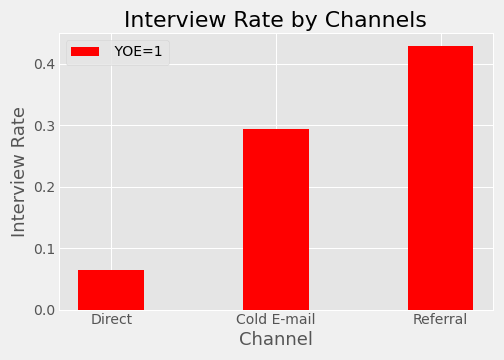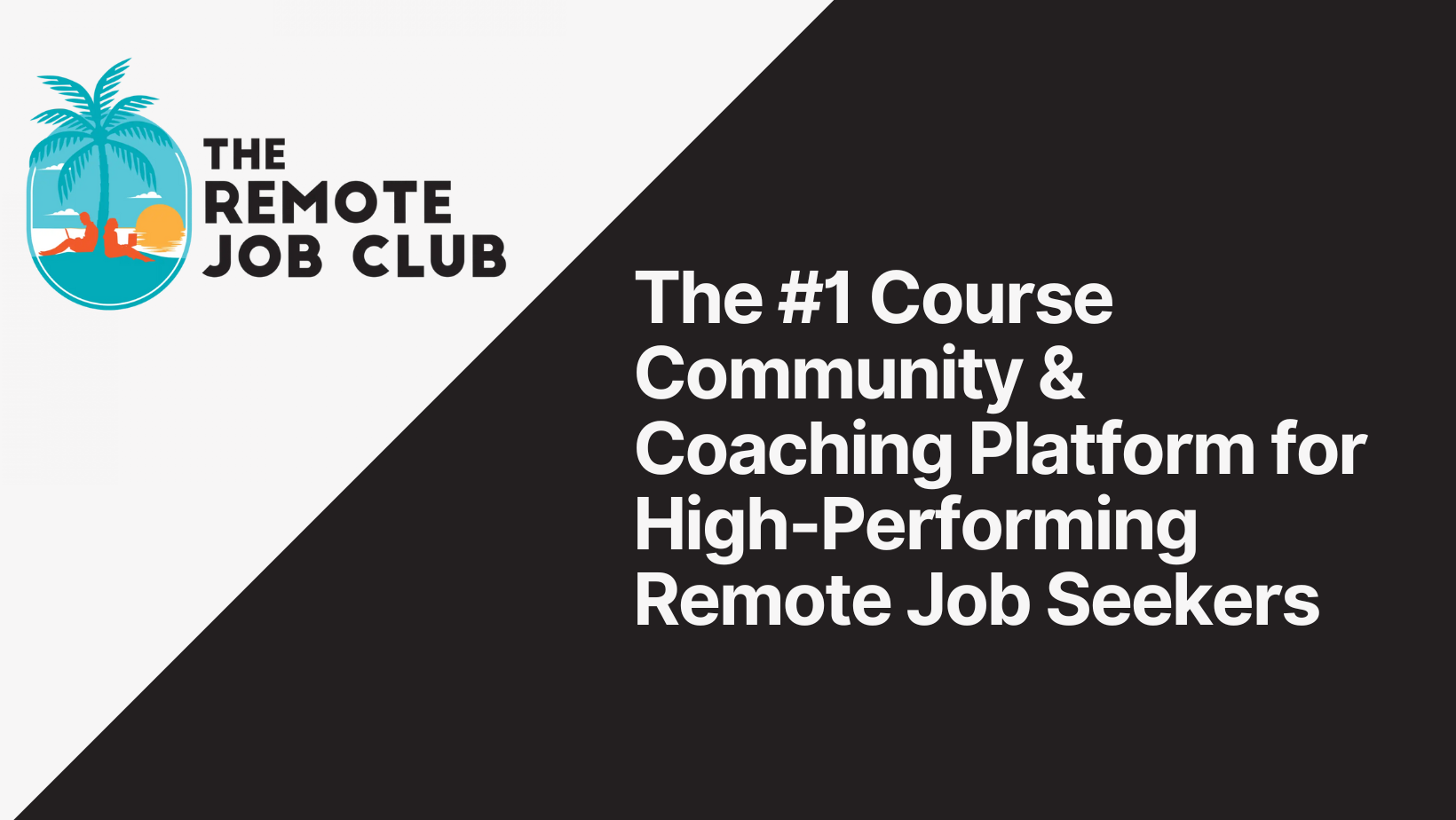Why You Should Stop Applying to Jobs
Stop applying to (so many) jobs!
The majority of job seekers I talk to are spending numerous hours a week scanning through endless job boards and submitting resumes.
The LinkedIn Easy Apply Button to them is like a shiny toy to a kid with ADHD. They can’t help but push it over and over again, sometimes 100s of times per week.
And while it may seem counterintuitive, the amount of time and effort spent applying should be a very small percentage of the total time allocated during a strategic and targeted job search.
This is why I’m advocating for you to stop doing it — because you’re probably doing it too much.
In this video and article, I’m going to tell you about the best way to spend your time in a job search that is more important than applying.
Let’s jump in.
Do Online Job Applications Work?
Before I get some people trashing me in the comments about this, I want to clarify, applying to jobs should be part of a mix of activities in your job search strategy.
In no way am I saying you shouldn’t apply at all.
But I am saying that you should use your time proportionally towards the activities that give you the highest chance of success. And, the more you apply, the more you’ll be focused on “Quantity > Quality,” which means the less you’re able to focus on creating unique and customized applications.
Lead Your Job Search with Networking
The statistics overwhelmingly show networking as the most effective way to land interviews and ultimately get hired.
Multiple studies estimate that 70%-85% of positions are placed through referrals.
So if you looked at a pie chart of the way you should spend your time during a job search, the majority of that pie would be focusing on the right relationships.
But, a lot of people skip this part.
They find listings on job boards, submit their resume, and sit back and wait for someone to call.
If that’s you, it’s time to rethink what you’re doing.
I recently read an interesting article by Jeff Li, a data scientist who received seven job offers during the worst job market in U.S. history.
He tracked all his data and published a blog about it. In one of his charts, he displayed the Interview Rate by Channel.
“Direct” stands for applying directly online, cold e-mail means he found the hiring manager’s email online and emailed them his resume directly, and referral means he was “sponsored” by someone in his network who advocated for him.
Here’s what Jeff had to say about his data:
Figuring out how to spend your time is an optimization problem. You want to minimize the amount of time you spend to maximize your ROI (offers). We all know that getting referrals is the best strategy.
While Jeff’s data has plenty of variables (his years of experience at the time, the job role, the companies he chose to apply to, etc), we can learn from him.
How Do I Network for a Job?
Since we’ve decided that you should be allocating most of your time to networking to find your job, many people wonder, how do I network in this way!?
I want to clear up the fact that networking is just the interactions you have with other people both online and in person.
To network effectively just means to build relationships strategically — which starts with value.
The best time to build your network, and cultivate authentic relationships is when you don’t need anything from them.
That’s why you should constantly be planting the seeds of your network, watering them with value, and then you’ll have a better ability to harvest later.
By waiting until you need something, like a job, to start networking, you’ll always reek of desperation. Plus, you won’t have had enough time to build strong connections with people who could help you.
Keep this in mind, because if you haven’t been building relationships as a regular part of your life before this, you may find this process more difficult, but it doesn’t mean you can’t commit to it now.
REACH OUT TO YOUR CURRENT CONNECTIONS IN YOUR NETWORK INDIVIDUALLY
Make a list of influential people in your network: former colleagues, friends, acquaintances, those that own businesses, the ones doing the job you’re looking to do, or working at the company you want to work at.
Come up with a way to reach out to each person in a way that may be valuable for them. Remember, value is subjective, but especially if you haven’t spoken to someone in many years, it can be awkward to try and get them “on your side” in a job search with a random message. Try to make it worth their time in some way.
Reach out in a customized way to each individual. Yes, this will take more time to do, but when you personalize outreach and take the time to thoughtfully reach out to people, you have a much higher chance of response and the ability to have a dialogue.
CONNECT WITH THOSE WHO CAN POTENTIALLY BE SPONSORS OR STAKEHOLDERS IN YOU GETTING A JOB
Identify the 2nd and 3rd connections who are working at the company you want to work at, doing the job you want to do, or can provide perspective to your career transition. You also want to identify other stakeholders such as recruiters and hiring managers at your target companies.
Find relatable ways you can reach out to these people. Many job seekers go straight to the hiring managers, but, personally, I recommend starting out with the people who are at your peer level. These relationships can be lower-hanging fruit and less pressure. Look at their background and connect with those who went to the same school, made a similar life transition, or post content about a shared interest of yours.
Reach out to these contacts in a unique and memorable way. Lean into the commonality you share and try to land an informational interview by providing value. If you can, leverage those relationships to get referred to hiring managers or recruiters. If not, reach out to the recruiters and hiring managers yourself in a unique way.
Bonus Tip: Use a value asset to establish trust and SHOW (not tell) a hiring manager or recruiter that you’re competent and unique.
Check out the video interview with Austin Belcak where he and I discuss this topic:
The Hidden Job Market: Getting a Job Without Applying
Building relationships through networking gives you access to the “hidden job market.”
The hidden job market is “a term used to describe jobs that aren’t advertised or posted online.” - Balance Careers
Because these roles aren’t posted online for the public to see, there’s much less competition, and it makes it possible to get a job without applying.
My client Kelly tapped into the hidden job market. She found a job listed that was a great fit for her at a high-growth tech company.
The problem?
She came from a very different background with no tech experience.
Our Game plan:
Set up 2 informational interviews with peers who worked at the company.
Create a personalized video and email to go directly to the hiring manager.
A unique follow-up sequence in case it didn’t get a response.
After a full week of completing the materials, the day came to apply...
And, it was gone.
The job was taken down and she was devastated.
She put in so much work and research.
"What now?"
"Send it," I said.
I encouraged her to connect with the hiring manager regardless. She created a new video about who she was, whom she knew, and why she was a great fit.
He was impressed.
So much so, she received an interview request within 24 hrs and an offer in 4 weeks... for a job that WASN'T listed.
Don’t give up when a job is taken down.
Don’t wait for a job to be listed to make a move.
It’s 100% possible to get a job without applying and you can find out more about Kelly’s story below:
Take an honest look at your job search strategy. If you’re simply blasting out your resume to opportunities without leveraging relationships, you’re not optimizing the way you’re spending your time.
And whether or not you’re trying to find a new job right now, building your network matters. It will follow you wherever you go in life and create opportunities in the future you can’t even imagine.
To gain an edge in your job search (and in your life), and to learn how to network effectively, download my FREE LinkedIn Networking Quick Guide, linked below.
5 Networking Mistakes to avoid being awkward or annoying on LinkedIn.
Customizable Scripts and Templates to make networking fun & intuitive.
Where to Find the Right Connections and how to provide value to them immediately.
Top Engagement Strategies to build trust and relatability with your target audience.
How to Build a Platform and "LinkedIn Landing Page" attract more opportunities.




